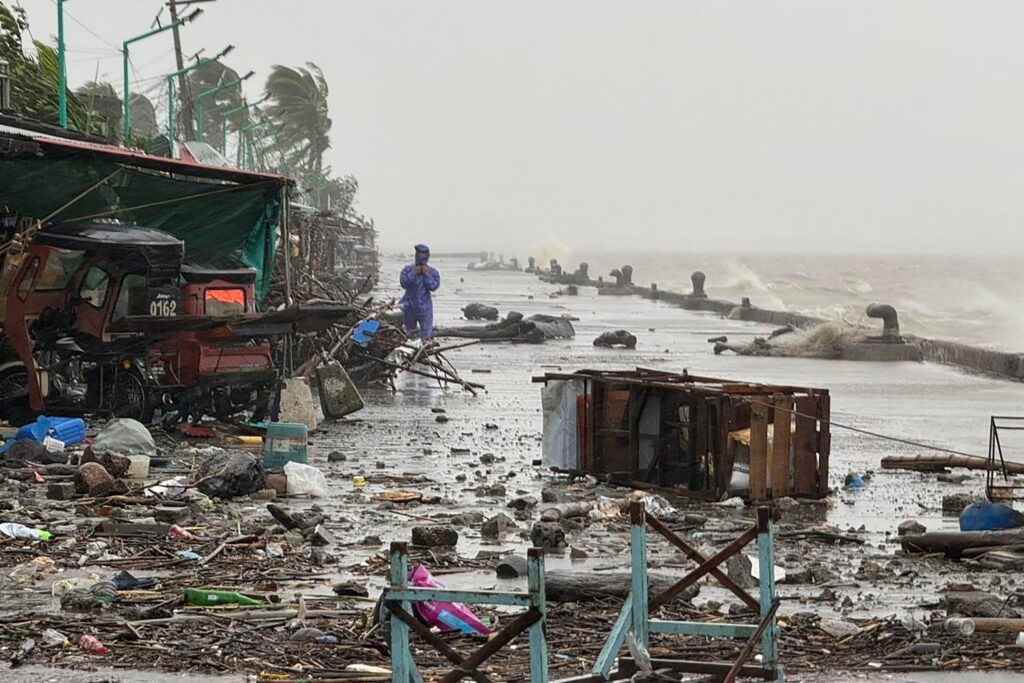UAE Filipino residents fear for family in path of super typhoon as one of the strongest storms of the year approaches the Philippines. Thousands of Filipino expatriates living in the UAE are experiencing growing anxiety as they try to reach relatives and loved ones in affected areas. With devastating winds, heavy rainfall, and widespread flooding predicted, the emotional toll on overseas workers is immense.
The Philippines, being in the Pacific typhoon belt, is no stranger to extreme weather. Yet, each storm carries its own level of uncertainty and fear, especially for families separated by thousands of miles. For many Filipino workers in the UAE, this super typhoon is not just another news headline—it is a personal crisis that hits home.
Rising Fear Among UAE Filipino Residents
Across Abu Dhabi, Dubai, Sharjah, and other emirates, Filipinos are glued to news updates and social media feeds to get the latest information about the typhoon. Messages flood WhatsApp groups and Facebook pages, with people checking in on friends and neighbors who still have family members in the storm’s path.

Many have shared their growing sense of helplessness, describing long hours spent trying to contact loved ones, only to encounter dead phone lines or disrupted communications. For some, even the last message from a family member can be a source of deep worry. Stories of roofs being ripped off homes, trees falling, and floodwaters rising have intensified anxiety among those far away.
Families in rural and coastal areas are particularly vulnerable, as local infrastructure may be insufficient to withstand such a strong storm. Even urban areas face the threat of flooding, landslides, and power outages. For UAE Filipino residents, this means that the worry does not end with news updates; it extends to every phone call that might not come, every message that goes unanswered.

Emotional Impact on Overseas Workers
The psychological impact of fearing for loved ones from afar cannot be underestimated. Filipino residents in the UAE often experience a mix of guilt and anxiety. Many feel torn between their obligations abroad and their desire to be physically present for their families during emergencies.
This anxiety is compounded by memories of previous typhoons, such as Haiyan, which left thousands dead and millions displaced. Even though these expatriates are living in a safe environment, the emotional connection to home remains strong. Their worry is not just for material damage but also for the health and safety of their family members, including elderly parents, children, and extended relatives.

Community Support and Solidarity
In the UAE, Filipino communities have mobilized to support each other emotionally. Community centers, social media groups, and informal networks have become lifelines for sharing information, providing updates, and offering comfort. Even small gestures, like checking in on neighbors or helping organize relief contributions, are meaningful ways of coping with the collective fear.
Churches and community organizations also play a crucial role. Many have started prayer chains, online vigils, and virtual support groups to help members navigate the anxiety and uncertainty. This sense of solidarity demonstrates how the Filipino diaspora relies on its networks to manage crises even when physically distant from home.
Communication Challenges
The typhoon has disrupted communication channels, which only intensifies the fear. Power outages, collapsed cell towers, and damaged roads make it difficult for residents in affected areas to reach their families abroad. For UAE Filipino residents, this often means waiting for days without any news, relying on secondary sources or other family members to piece together information about their loved ones.
Some have resorted to calling local government offices or emergency hotlines, but the response can be slow due to the scale of the disaster. Social media has become an indispensable tool, but even there, misinformation and delays can cause further stress.
Evacuations and Safety Measures in the Philippines
Authorities in the Philippines have issued evacuation orders and storm surge warnings. Tens of thousands of residents in coastal and low-lying areas have been relocated to temporary shelters to protect them from rising waters and high winds. Local governments have mobilized resources for emergency response, and volunteers are assisting in moving people and providing basic necessities.
For Filipino expatriates in the UAE, these updates bring a mix of relief and continued concern. While they are glad that measures are being taken to safeguard their families, the sheer scale of the storm makes the outcome uncertain. Each evacuation update is both reassuring and nerve-wracking, as the storm’s intensity continues to threaten lives and property.
Coping with Anxiety from Afar
UAE Filipino residents are using various methods to manage their anxiety during this crisis. Keeping busy with work, connecting with friends and community members, and participating in online support groups helps mitigate the feeling of helplessness. Many also turn to prayer and meditation, reflecting the strong spiritual practices that are part of Filipino culture.
Sharing personal stories and updates, even small details about safety and survival, has become a coping mechanism. It allows individuals to feel connected despite physical distance and reinforces the bonds within the Filipino community.

Long-Term Concerns
Beyond the immediate danger, many Filipino expatriates are worried about the long-term effects of the typhoon on their families. Homes and livelihoods may be destroyed, crops and businesses damaged, and communities disrupted. For workers sending remittances back home, the concern is also financial—how will families recover, and how can they continue to provide support from afar?
The path to recovery after a major typhoon is often long and difficult. Overseas Filipinos are aware of this and are preparing to provide assistance in various ways once it is safe to do so. Fundraising, coordinating donations, and even planning trips home are some of the ways they intend to help in the aftermath.
Hope and Resilience
Despite the fear and uncertainty, the resilience of both the Filipino families in the Philippines and the expatriates in the UAE is evident. Communities come together, neighbors check on each other, and overseas workers offer emotional and material support whenever possible. Stories of survival and assistance spread quickly, providing hope amid the chaos.
For many UAE Filipino residents, the crisis strengthens the connection to their homeland and reinforces the importance of family, solidarity, and compassion. Even while separated by distance, they remain deeply involved in their families’ well-being, demonstrating extraordinary resilience and care.
Conclusion
UAE Filipino residents fear for family in path of super typhoon as they face one of the most stressful moments of their lives. The combination of physical distance, disrupted communication, and the sheer power of the storm creates a situation filled with anxiety and uncertainty. Yet, within this crisis, the strength of the Filipino community shines through.
Through solidarity, prayer, communication, and support, both in the UAE and in the Philippines, hope persists. Families wait for news, communities work together, and individuals continue to demonstrate courage in the face of adversity. While the storm poses a serious threat, the unity, compassion, and resilience of the Filipino people remain a powerful force that carries them through even the most challenging times.
For now, the focus of UAE Filipino residents is clear: the safety and well-being of their families back home, hoping for the day when they can finally reconnect and see that their loved ones have weathered the storm safely.
Do follow UAE Stories on Instagram
Read Next – Tensor Robocar Unveiled in Dubai: Future of Mobility














